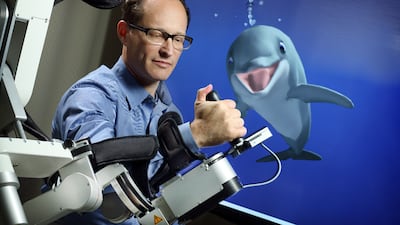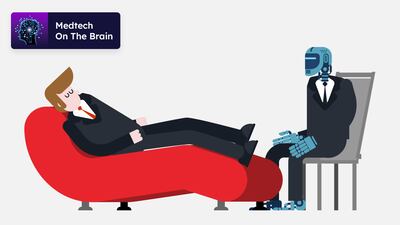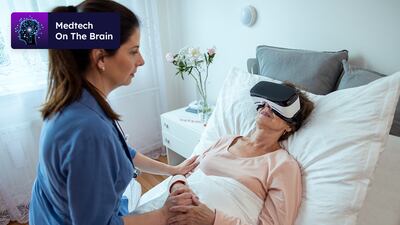Behavioral Health
In this week’s Digital Health Roundup, Medtech Insight’s Ryan Nelson highlights Click Therapeutics’ FDA-cleared digital therapeutics (DTx) for depression and Sinaptica Therapeutics’ personalized neuromodulation for Alzheimer’s patients. Marion Webb discusses her interview with MindMaze’s John Krakauer on their gaming-focused DTx to help people recover from serious brain injuries. Elizabeth Orr introduces new voting members of the new Digital Health Advisory Committee and Natasha Barrow discusses Hello Heart’s new symptom-tracking feature in their heart-focused app.
In this week’s Digital Health Roundup, Medtech Insight’s Ryan Nelson highlights Click Therapeutics’ FDA-cleared digital therapeutics (DTx) for depression and Sinaptica Therapeutics’ personalized neuromodulation for Alzheimer’s patients. Marion Webb discusses her interview with MindMaze’s John Krakauer on their gaming-focused DTx to help people recover from serious brain injuries. Elizabeth Orr introduces new voting members of the new Digital Health Advisory Committee and Natasha Barrow discusses Hello Heart’s new symptom-tracking feature in their heart-focused app.
This week, two device testing labs in China landed FDA warning letters; refunds for 1Health.io clients; FDA AR/VR product list expands.
MindMaze seeks to create a beautiful immersive experience for patients recovering from brain injuries. Chief medical director John Krakauer, clearly a “Star Wars” fan, discusses the significant need for digital therapeutics at a time when therapists are in short supply, as well as the challenges facing the DTx space as a whole.
This week, Medtronic recalled a nerve monitoring system due to reports of false responses. The US FDA approved the first auto-injector for opioid-overdose, made by Purdue Pharma. The agency granted de novo authorization for Labcorp’s PGDx elio plasma focus Dx used by labs for genetic profiling. As of 7 August, 950 AI/ML devices have been approved by the FDA. EKO Health teamed up with LSU to help detect arrhythmias and murmurs in student-athletes.
Big Health announced it received FDA clearance for its digital therapeutics for insomnia and hopes a new CMS fee schedule will pave the way to reimbursement.
Unilabs and C2N Diagnostics signed a multi-year agreement that will expand access to C2N’s Alzheimer’s tests in Europe and other countries.
In this month’s Digital Health Roundup, Medtech Insight’s Marion Webb highlights AI discussions at the HLTH Europe conference and an interview with Motif Neurotech's CEO Jacob Robinson. Elizabeth Orr discusses DeepWell DTx's newly launched VR game for treating stress-related hypertension and anxiety. Natasha Barrow provides an overview of Digital Mental Health Technologies regulation in the UK and Brian Bossetta reports ‘the good and bad’ from Medtronic's report on digital technologies' use in the operating room.
Zengence, the first virtual reality game intended to help reduce stress, became available earlier this summer. We talked to DeepWell DTx founder Ryan Douglas about the road ahead.
The FDA has published final guidance to assist developers of medical devices designed to treat opioid use disorder, along with considerations for sponsors of clinical studies to evaluate those devices.
Sonara Health founder Michael Giles talks take-home methadone treatments, remote patient monitoring and sponsoring legislation to fund opioid treatment programs.
Vijay Ravindran, founder of autism therapy digital therapeutic firm Floreo, spoke to Medtech Insight about working with the FDA and why the TAP pilot made sense for them.
This week, AdvaMed and MITA win appeal to prevent repair companies from hacking medical devices, the FDA cleared Abbott’s Libre Rio CGM for OTC sales, J&J MedTech wins expanded clearance for Velys knee medical robot, the FDA updates its AI program, Canary Speech secures $13m in series A funding and Xeltis won FDA approval for an IDE submission to begin enrolling patients for a pivotal study for aXess.
Spun out from Cedars-Sinai to VRx Health, Inc., Xaia provides “AI-enabled, conversational therapy in relaxing spatial environments such as a creek-side meadow or a sunny beach retreat,” using the Apple Vision Pro virtual reality headset. Its insights have been eye-opening, showing significant promise for on-demand therapy at a time when mental health resources are stretched.
Cedars-Sinai’s Virtual Medicine director Brennan Spiegel discusses the shortage of mental health professional resources and how Medical Extended Reality – e.g., immersing patients in a virtual world with an AI therapy avatar – is helping to address depression, pain, and a growing host of health and wellness needs in hospital and consumer settings.
Cedars-Sinai’s Virtual Medicine director Brennan Spiegel discusses the shortage of mental health professional resources and how Medical Extended Reality – e.g., immersing patients in a virtual world with an AI therapy avatar – is helping to address depression, pain, and a growing host of health and wellness needs in hospital and consumer settings.
Astellas Pharma’s chief commercial officer discusses the biopharma industry’s responsibility to drive change in health care.
US FDA neurological device office head David McMullen is watching digital health tools make mental health treatments more widely available than ever before, though the expansion comes with some risks. Medtech Insight spoke with him about the FDA’s role in this growing field.
Motif’s “pea-sized” Digitally programmable Over-brain Therapeutic (DOT) requires 20 minutes to implant and can be activated at home with a wearable to “lift the fog” for people with depression. Motif CEO Jacob Robinson believes data captured by brain-computer interfaces and continuous monitoring will eventually be able to identify key biomarkers that enable psychiatrists to head off mental health crises.
Two Chairs, which uses algorithms to match the right therapists with patients, secured $72m in investment to expand its business.
ADVERTISEMENT


















